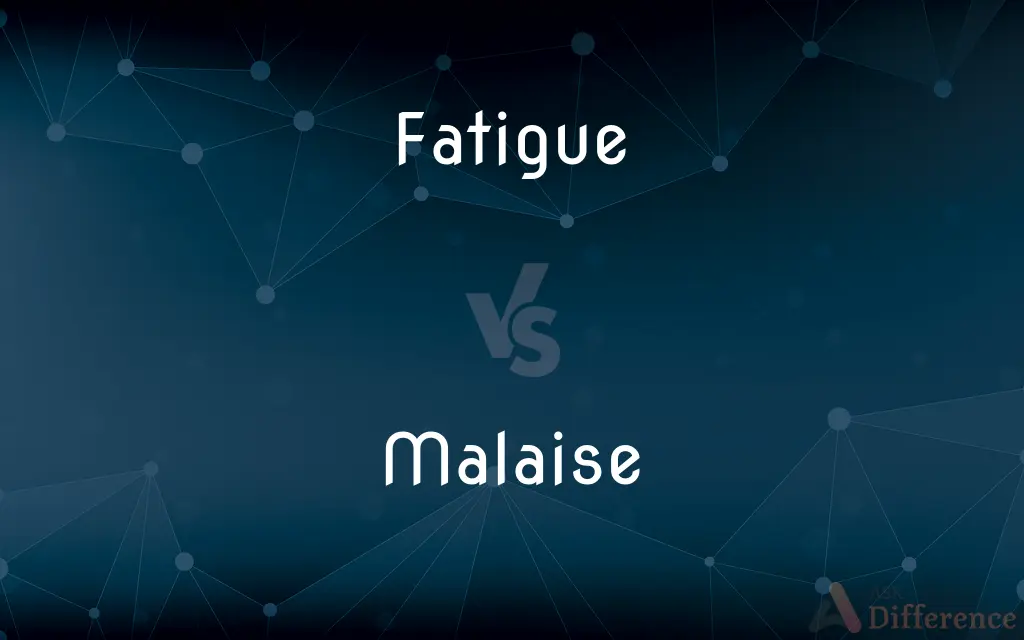Fatigue vs. Malaise — What's the Difference?
By Urooj Arif & Fiza Rafique — Updated on February 24, 2024
Fatigue is a state of extreme tiredness or exhaustion, often physical, while malaise is a general feeling of discomfort, unease, or being unwell, often more vague and not limited to tiredness.

Difference Between Fatigue and Malaise
Table of Contents
ADVERTISEMENT
Key Differences
Fatigue is a specific condition characterized by a deep sense of tiredness or exhaustion that can result from physical exertion, lack of sleep, stress, or health issues. It is often relieved by rest and sleep. In contrast, malaise is a broader, more diffuse feeling of discomfort or uneasiness that can signify the onset of an illness or a state of general ill health. It is not solely associated with tiredness and is not typically alleviated by rest alone.
Fatigue primarily affects physical and sometimes mental capacities, making tasks seem more strenuous and requiring more effort, while malaise encompasses a wider range of symptoms, including a lack of energy, general discomfort, and an overall sense of being unwell. Malaise may accompany fatigue but extends beyond it to include a sense of bodily discomfort.
Fatigue can be a symptom of many conditions, but it is often recognized as a direct consequence of certain activities or lifestyle factors, such as intense physical labor, exercise, or sleep deprivation. On the other hand, malaise is more likely to be indicative of an underlying medical condition, such as an infection, inflammation, or other systemic issues, and often requires medical evaluation to determine its cause.
The experience of fatigue is generally more tangible and easier to describe than malaise, as it relates specifically to the feeling of exhaustion and the need for rest. Malaise, however, is more elusive and subjective, often described in vague terms, making it a more complex symptom to diagnose and treat.
Fatigue is a focused, often quantifiable state of exhaustion that primarily impacts physical and mental performance, while malaise is a broader, more nebulous feeling of being unwell that can signal a range of health issues and is not limited to the realm of tiredness or exhaustion.
ADVERTISEMENT
Comparison Chart
Definition
Extreme tiredness or exhaustion, often after physical or mental activity
General feeling of discomfort, uneasiness, or being unwell
Primary Association
Physical and mental exhaustion
Broad discomfort and ill health
Symptoms
Weakness, lack of energy, sleepiness
Lack of energy, discomfort, unease
Causes
Physical exertion, lack of sleep, stress, medical conditions
Often indicative of an underlying medical condition
Relief
Rest and sleep
Medical evaluation and treatment of underlying cause
Compare with Definitions
Fatigue
Extreme tiredness resulting from mental or physical exertion.
After the marathon, her fatigue was so intense that she could barely stand.
Malaise
A general feeling of discomfort or unease indicating ill health.
A vague malaise overtook her, hinting she was coming down with something.
Fatigue
A state of weariness that decreases one's efficiency.
Continuous overtime work led to a level of fatigue that coffee couldn't fix.
Malaise
A sign of an impending illness.
The sudden malaise was the first sign of his mononucleosis.
Fatigue
The weakening of a material due to repeated stress.
The bridge collapsed due to metal fatigue.
Malaise
A condition of general bodily weakness.
The flu left him with a lingering malaise that lasted for weeks.
Fatigue
A reduction in responsiveness after prolonged stimulation.
After hours of driving, he experienced sensory fatigue.
Malaise
A sense of mental or moral unease.
There was a malaise among the team members due to the unresolved conflict.
Fatigue
Physical or mental exhaustion that inhibits performance.
The soldiers' combat fatigue compromised their ability to focus.
Malaise
A widespread sense of dissatisfaction or unease within a community.
The economic downturn caused a malaise that affected everyone in the town.
Fatigue
Fatigue is a feeling of tiredness. It may be sudden or gradual in onset.
Malaise
A general sense of depression or unease
"The markets remain mired in a deep malaise" (New York Times).
Fatigue
Physical or mental weariness resulting from effort or activity.
Malaise
An ambiguous feeling of mental or moral depression.
Fatigue
Something, such as tiring effort or activity, that causes tiredness or weariness
The fatigue of a long hike.
Malaise
A vague feeling of bodily discomfort, as at the beginning of an illness.
Fatigue
To tire out; exhaust.
Malaise
A feeling of general bodily discomfort, fatigue or unpleasantness, often at the onset of illness.
Fatigue
To cause to undergo the process of fatigue.
The repeated pressurization cycles fatigued the airplane's metal skin until it eventually broke up in flight.
Malaise
An indefinite feeling of uneasiness, or of being sick or ill at ease.
Fatigue
To weary with labor or any bodily or mental exertion; to harass with toil; to exhaust the strength or endurance of; to tire.
Malaise
Physical discomfort (as mild sickness or depression)
Fatigue
Used of materials (especially metals) in a weakened state caused by long stress;
Metal fatigue
Fatigue
Get tired of something or somebody
Common Curiosities
Is malaise always a sign of serious illness?
Not always, but malaise can be an early indicator of various conditions, some of which may be serious, warranting medical attention.
Can fatigue be a symptom of malaise?
Yes, fatigue can be a component of malaise, as malaise often encompasses a range of symptoms including tiredness.
How can you tell the difference between fatigue and malaise?
Fatigue is specifically related to tiredness and exhaustion, while malaise is a broader feeling of discomfort that may include fatigue but also encompasses other feelings of unwellness.
How are fatigue and malaise treated?
Treatment for fatigue often involves rest, lifestyle changes, and addressing the underlying cause. Malaise treatment targets the underlying condition and may include medication, rest, and other therapeutic interventions.
Is it possible to experience fatigue without malaise, and vice versa?
Yes, it's possible to experience fatigue without the broader symptoms of malaise, such as after intense exercise. Similarly, malaise can occur without significant fatigue, as in the early stages of some illnesses.
Are there specific tests to diagnose fatigue or malaise?
There are no specific tests for fatigue or malaise themselves, but tests may be conducted to identify underlying causes contributing to these symptoms.
Can mental health issues cause fatigue or malaise?
Yes, mental health issues such as depression and anxiety can contribute to both fatigue and malaise.
Can dehydration cause fatigue or malaise?
Yes, dehydration can contribute to both fatigue and malaise by affecting the body's overall function and energy levels.
Is it normal to feel malaise without any apparent cause?
Occasional feelings of malaise can be normal, but persistent or severe malaise without a clear cause should be evaluated by a healthcare provider.
Can exercise help with fatigue and malaise?
Moderate exercise can help alleviate fatigue and improve overall well-being, but it's important to consult a healthcare provider if malaise is present, as it could be a sign of underlying illness.
How do stress and anxiety relate to fatigue and malaise?
Stress and anxiety can significantly contribute to both fatigue and malaise by affecting the body's physiological and psychological state.
Can diet affect fatigue and malaise?
Yes, a poor diet lacking essential nutrients can contribute to feelings of fatigue and malaise.
Can fatigue and malaise affect cognitive functions?
Yes, both fatigue and malaise can impair cognitive functions, affecting concentration, memory, and decision-making.
Is there a psychological aspect to malaise?
Yes, malaise can have psychological dimensions, including feelings of unease, dissatisfaction, and general discontent.
How important is sleep in managing fatigue and malaise?
Adequate sleep is crucial in managing fatigue and can also impact malaise, particularly if the malaise is partly due to fatigue.
Share Your Discovery

Previous Comparison
Subrogee vs. Subrogor
Next Comparison
Over vs. ExceedAuthor Spotlight
Written by
Urooj ArifUrooj is a skilled content writer at Ask Difference, known for her exceptional ability to simplify complex topics into engaging and informative content. With a passion for research and a flair for clear, concise writing, she consistently delivers articles that resonate with our diverse audience.
Co-written by
Fiza RafiqueFiza Rafique is a skilled content writer at AskDifference.com, where she meticulously refines and enhances written pieces. Drawing from her vast editorial expertise, Fiza ensures clarity, accuracy, and precision in every article. Passionate about language, she continually seeks to elevate the quality of content for readers worldwide.














































